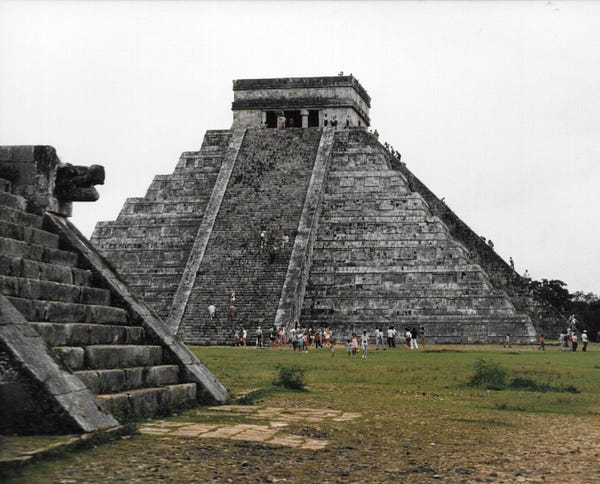Today’s Contemplation: Collapse Cometh LXXXVIII
January 2, 2023 (original posting date)

Collapse: Just Like Boiling A Frog
As I continue to work on my multipart contemplation regarding our energy future (Part 1; Part 2), thought I would throw out this ‘brief’ one that shares my comment on the most recent post by The Honest Sorcerer, whose writing in general continues to parallel my own (probably not surprising given the increasing evidence regarding the trends in the topic(s) we discuss).
Great article. As the saying goes: it’s difficult to make predictions, especially about the future[1]. We mostly look at current trends and extrapolate them into the future, believing that tomorrow will unfold much like today — and we do this for pretty sound reasons but mostly because our primate brains have extreme difficulty comprehending complex systems and their nonlinear feedback loops and emergent phenomena. In a time of flux/chaos/transition, such an approach is not always such a good strategy — to say little about all the Black Swans circling overhead[2].
One of the places I default to when hoping to give some certainty to the future (something homo sapiens strongly desire[3]) is the past. This is likely because of my ‘brief’ educational background and work in pre/history (aka archaeology)[4].
While technology has dramatically changed some aspects of how we re/act (i.e., adapt) to our changing environment through our problem-solving abilities, we tend to follow a similar path to our distant ancestors by way of leveraging our tools and ingenuity to help us survive and adapt (agriculture being perhaps the big one that resulted in food surpluses, sedentary lifestyles, exponentially increasing populations, and eventually organizational structures that led to differential access to resources, sociopolitical complexity and, perhaps finally, territorial competition[5]); but these solely human abilities can only take us so far in a world of biogeochemical limits — particularly when the energy required to sustain all our complexities have encountered significant diminishing returns and resulted in catastrophic ecological systems breakdown.
Mix in cognitive and social psychology, biological principles, and physical limits and laws, and we humans can more or less get a better picture of the path(s) we are likely to take in our societal evolutionary journey. One only need review the business-as-usual scenario painted by Meadows et al. in The Limits to Growth for a fairly accurate longer-term prediction of how a world with hard limits will unfold[6].
Based upon all previous experiments with complex societies over the past ten millennia or so, ‘collapse’ appears unavoidable. This decline in complexity (which is what ‘collapse’ is when one gets right down to it and ignores all the emotional baggage we’ve tied to the term) manifests itself in less; less in terms of: social differentiation/stratification; occupational specialization; centralised control by political elite; behavioural control/regimentation; investment in the epiphenomena of complexity — i.e., monumental architecture, artistic and literary development; flow of information between groups; sharing, trading and redistribution of resources; and, coordination between polities[7]. This is a simplification (or Great Simplification as Nate Hagens has termed it[8]) of our adaptive complexities, something that likely would have happened much sooner had we not leveraged fossil fuels to hyper-complexify human adaptations and extend/expand — temporarily — the planet’s carrying capacity for homo sapiens.
Given how far we’ve overshot our natural environmental carrying capacity and consequently degraded our much needed environments and ecological systems — and overexploited virtually every corner of our planet — this inevitable simplification may actually end up being even more dramatic than previous experiments as Catton has pointed out in Overshoot[9].
The journey to this endgame of a substantially simpler future is sure to be the hard part. Increasing geopolitical tensions between competing polities for scarcer resources is sure to occur. Concomitantly, the ruling caste is certain to tighten their grip on their domestic populations by way of authoritarian tendencies (e.g., behavioural and narrative control via increased mass surveillance, militarisation of police, media influence). We are going to witness a continuing breakdown of ecological systems and environmental degradation yet be told these are temporary or reflective of ‘natural’ change. Our Ponzi-type financial/monetary/economic systems are going to be further manipulated from their current highly-manipulated states and any ‘temporary’ deviations from the economy-is-great narrative will be blamed on some evil ‘other’ rather than our own ruling caste and their ongoing machinations.
Like the story about being able to boil a frog alive because of minute temperature changes that go unnoticed, we may miss the little steps that take us to an entirely different world than the one we currently exist within and accept that everything is ‘normal’ despite evidence to the contrary. The ruling caste has learned to be quite adept in manipulating our beliefs about life and their abilities to ‘protect’ us.
All of this said, the future is both unknowable and unpredictable. It will hold many surprises, particularly for the vast majority of people who are just struggling to get through another day/week/year and tend to defer to the ‘authority’ figures that promise them this, that, and everything…